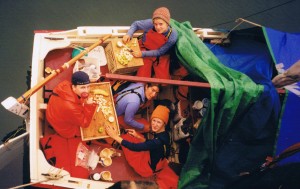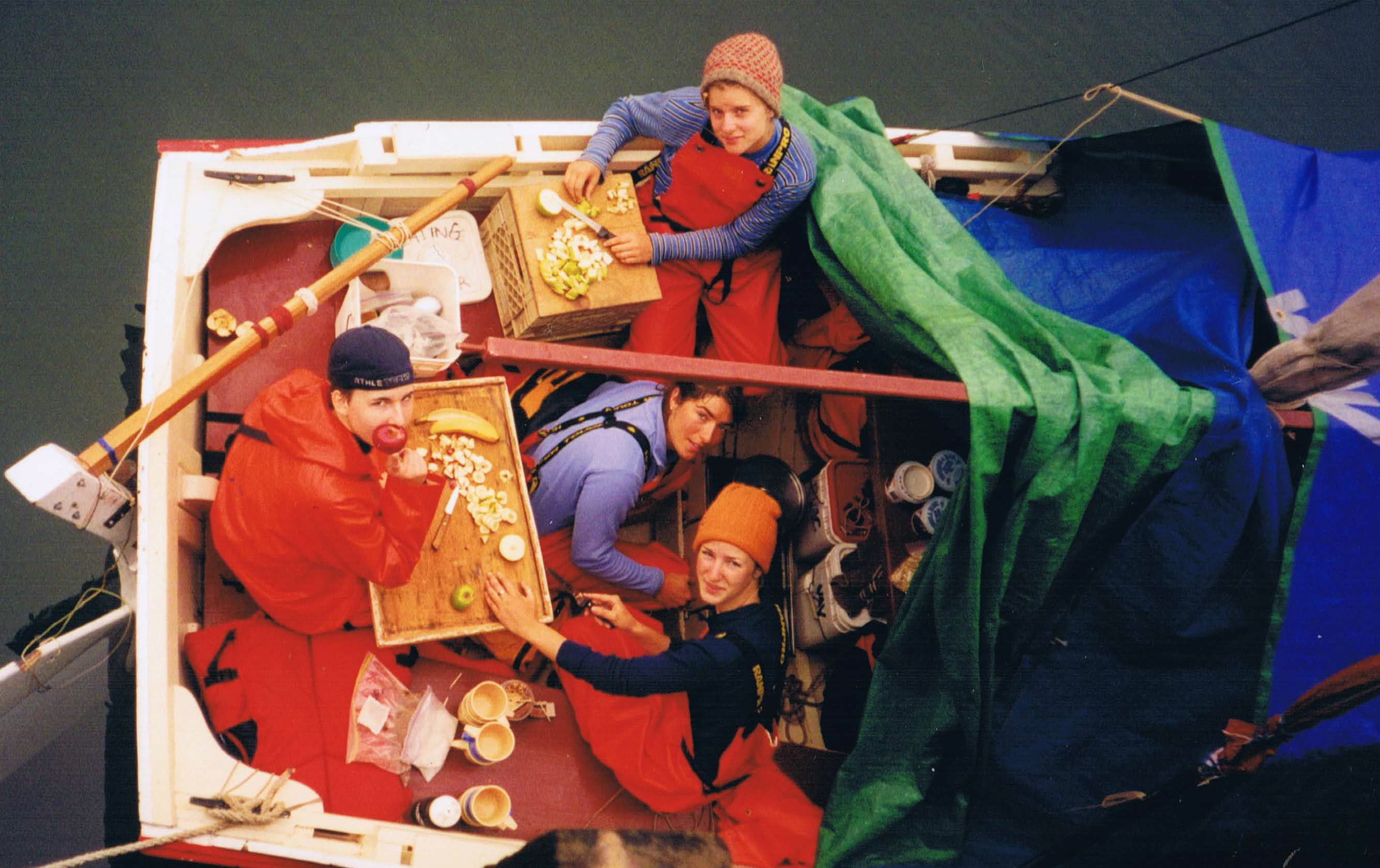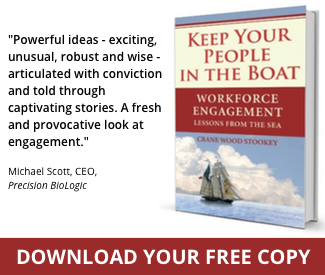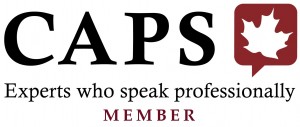Efficiency can be remarkably inefficient. It leads us to focus on the things we can be efficient about, which may not be the things that get us farthest toward where we, or our organizations, need to be.
Especially for engaging people and offering them ways to grow and learn, to become better at their jobs and more energized as people, efficiency just isn’t very efficient. That’s because engagement and growth take time, and efficiency is always in a hurry, and has no patience. But as Margaret Wheatley has said, “Urgency destroys capacity.”
Is this a paradox? Isn’t efficiency supposed to increase capacity by helping us get more done in less time? The question is, do we do the most things, or do we do the things that matter most? And in the big picture, the picture big enough to build real capacity, what really matters?
 Here’s an example: On a Nova Scotia Sea School adventure voyage, the food for the teenage crew is kept in watertight plastic buckets. The Sea School’s boat is completely open to the weather, and everything gets wet and stepped on. The buckets protect food and gear for the week-long voyage.
Here’s an example: On a Nova Scotia Sea School adventure voyage, the food for the teenage crew is kept in watertight plastic buckets. The Sea School’s boat is completely open to the weather, and everything gets wet and stepped on. The buckets protect food and gear for the week-long voyage.
Each bucket has all the food for a single meal, so the buckets are labeled “Dinner Day 1” or “Breakfast Day 5”. Some instructors like to load the food buckets into the boat in order, so the first meal is forward at the bow, the second meal next to it and so on. That way it’s easy to find the appropriate meal.
Other instructors let the crew load the buckets haphazardly, in no order at all. They don’t do this because they’re lazy or disorganized, but because without a system the crew has to have a greater awareness of where things are. When the cook for the day asks, “Where’s Day 4?” at dinner time, the crew goes into search mode. Either someone knows because they were paying attention, or no one knows and we all have to look, reminding us that it helps to pay attention. This kind of awareness of our surroundings, the ability to deal with our stuff, is one of the main goals of the Sea School’s youth development work.
It’s an inefficient way of finding the food but a very efficient way of developing people’s awareness of what’s going on around them. People who focus on getting things done are often not the best at working with the subtleties of other people’s state of mind, at bringing out the best in others. Having a state of mind that is attuned to what’s going on with the buckets is a step toward a state of mind that is attuned to what’s going on with ourselves, our shipmates, our organization.
The point of this is not that we should scatter our inventory all over the warehouse so our employees can practice greater awareness of their surroundings. The point is that when it comes to the kind of leadership that is generous enough to create conditions for others to develop their capacity as people, it can be efficient to leave efficiency behind. Growth takes time, and we can not systematize it. The most efficient way to lead people to their personal best is to not be in a hurry.




We are reminded of this, the Jevons Paradox, as we face global warming. Efficient engines delivering better miles per gallon tempt us to drive more miles, negating any savings in fuel costs or CO2 emissions. Streamlined road intersections and other innovations that increase traffic flow don’t get us to our destination faster; they just attract more drivers to that road.
Yes, I’ve always thought the solution to traffic congestion was to narrow the roads. I understand that in Copenhagen the planners base their decisions on making it easiest for pedestrians to get around, then bikes, and cars have to take very roundabout and inconvenient routes. We can be efficient with traffic, but we don’t know how to be efficient in preserving the planet, so we focus on traffic. We can be efficient in creating inter-office communications software, but don’t know how to be efficient in creating good interpersonal communication, so the software doesn’t help.
Right. A city in Sweden (I believe it was) made the decision to plow the snow from the bike roads first, then from street (for cars) in order to encourage people to hope on bikes instead of packing cars in the street. Applies in winter time only
Question is, how do they get the political will to make that happen? Here in Halifax, where there are hardly any bike lanes anyway, there would be a huge outcry. How do we get a society to start thinking about efficiency in larger terms?
Insightful post. Yes, there are many small and not so small efficiencies that ultimately take us down a wrong road. Dictatorships, for example, tend to be very well organized and successful for a time. As my grandmother saw with her own eyes, Mussolini did make the trains run on time. He will not be missed.
We have so much allegiance to accomplishment, and often too little allegiance to understanding, so we can’t see the right things to accomplish. Assuming the right things are what make the world a better place for everyone, rather than a better place for those in power, like your grandmother’s experience.